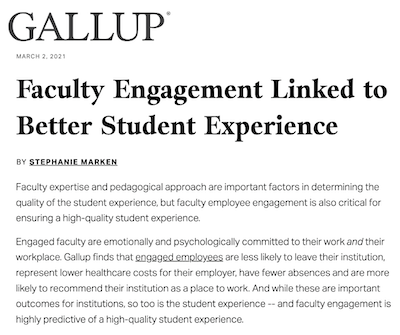Courtney Brewer
The promotion cycle is underway for 26 of our full-time FA colleagues. This means they are being observed and reviewing their observation and evaluation forms. It also means that they have colleagues who are willing to assist them in the process, which means a lot. I am truly grateful to those who have volunteered to serve as College Promotions Committee (CPC) reps and as peer observers. Taking time out of your already busy schedule is a valuable service to your peers. With fewer full-time faculty in our ranks, we see the same names appearing on lists for governance, campus, college and search committees. Our upcoming reaffirmation of our accreditation through Middle States will also include the creation of working groups for the various standards which we will be reporting on, and those groups will need members. There is a lot of work to be done and a shrinking number of people who are stepping up to do the work. I like to remind everyone that FA service is service to the college, so if you are not yet in the promotion cycle, you can take advantage of service opportunities like helping out a peer in your area by serving as a CPC rep or peer observer. You do not need to be fully promoted to serve in either role, just a full-time FA member who is willing to help. What is involved in being a CPC rep? A CPC rep is an individual who is assigned to review the promotion applications (A forms) for the full-time faculty applying for promotion in their department or area. Departments are asked to identify their CPC rep for each promotion cycle. The CPC rep reads the A form for each candidate they are assigned and completes an evaluation form wherein they highlight the strengths of the A form and include additional information they feel speaks strongly to the case for promotion. Then, in December, the CPC reps and I will meet with the respective executive dean to advocate for the candidate’s promotion (adjunct faculty are not assigned CPC reps as part of their promotion process). What is involved in being a peer observer? Everyone in the promotion cycle must be observed by their academic chair or supervisor in the fall semester after their application is submitted. Full-time faculty in the promotion cycle are required to have a peer present at their observation; adjunct faculty are not required, but it is strongly recommended that they have a peer present during their observation by their academic chair or supervisor. It is important that the peer be present at the same time as the chair or supervisor, so everyone is commenting on the same event. The observation is a snapshot in time of a candidate performing their primary role. For classroom faculty, this is teaching a class. For nonclassroom faculty, it can take a little more creativity to design an experience that can be observed. Some nonclassroom faculty create a PowerPoint and walk their supervisor and peer through their accomplishments, while others create a presentation for other members in their area and use that for their observation. For some, it is difficult to find a peer when they are part of a very small department or area. Sometimes adjunct faculty have difficulty finding a peer, who needs to be available on the same day and time as the candidate as well as the chair or supervisor. One important point to remember: you cannot serve as both a peer observer and a CPC rep for the same candidate. After the observation, the peer observer completes an observation form and submits it for inclusion in the candidate’s promotion file. All evaluation and observation forms are reviewed and signed by the candidate before submission, making it a collaborative process. Serving as a CPC rep or a peer observer is a great way to get to know more about your colleagues and about the promotion process in general, while earning service experience for your own future A form. What other service opportunities can I explore? Committee membership and leadership also constitutes college service. The FA has various committees that members can become involved with. We also have a few vacant Executive Council (EC) representative positions which we would love to see filled with members who are willing to serve as the union rep for their area. New members should also ask their chair or supervisor for information on opportunities within their department or area. It is never too early to start getting to know people, getting to know the various ways in which the college operates, and earning service credit. I’m an adjunct faculty member. Do I need to have service experience on my promotion application? Adjunct faculty are not expected to serve on campus or college committees, and there is no required service component for promotion. The FA does, however, have a few vacant EC representative positions, and we welcome adjunct faculty on our committees. By the end of November, the full-time faculty who are in the promotion cycle must have their observations completed and all of their forms submitted. By the end of the semester, they must have each met with their campus executive dean to discuss their application—and when the semester ends there will be a feeling of relief that this stage of the process is complete. The promotion committee will meet in January and forward their recommendations to Dr. Bonahue. By March, promotion decisions will be made and shared with the candidates. All successful promotions will take effect in September 2025, by which time we will be working with the next group of candidates. |
